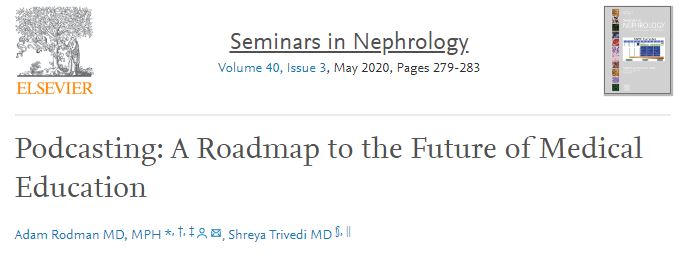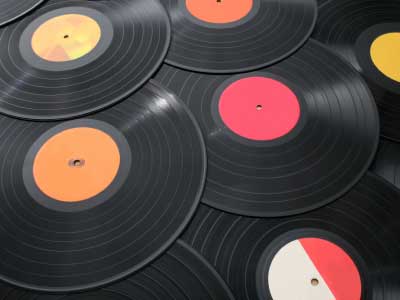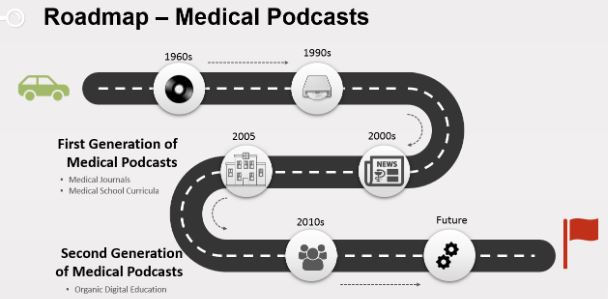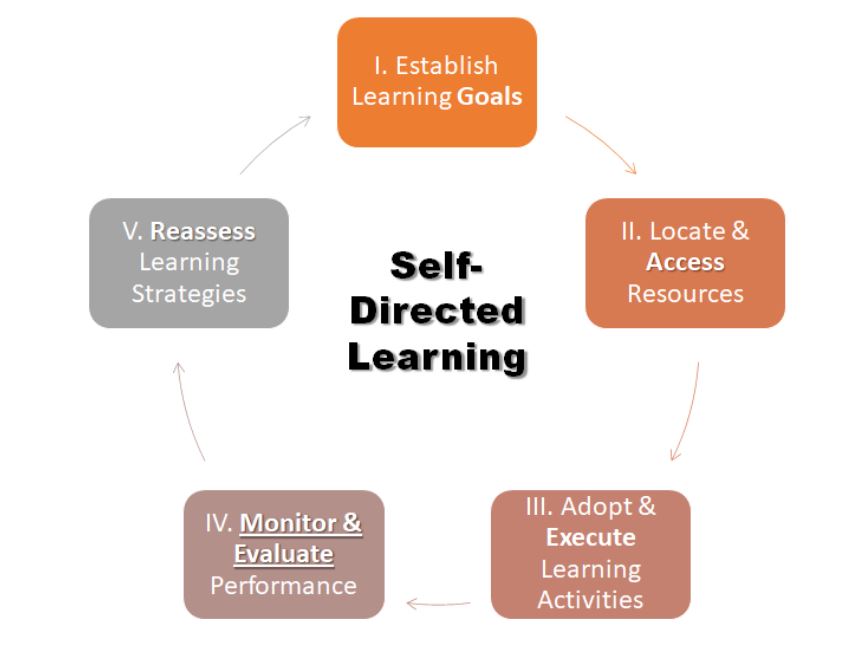Many of us already listen to amazing medical podcasts like @TheCurbsiders, @CPSolvers, @NephJC_Podcast, @medrants #AnnalsonCall in our own time
-- but will medical podcasting be integral to medical education?
-- but will medical podcasting be integral to medical education?
#SpoilerAlert: Yes
@ShreyaTrivediMD and I contributed this article on the evolution of podcasting in med ed and our vision for the future to @kidney_boy #SoMe edition of Seminars in Nephrology. You can read it here ( https://www.sciencedirect.com/science/article/pii/S0270929520300474?dgcid=author)
But">https://www.sciencedirect.com/science/a... first it’s time for a Tweetorial!
@ShreyaTrivediMD and I contributed this article on the evolution of podcasting in med ed and our vision for the future to @kidney_boy #SoMe edition of Seminars in Nephrology. You can read it here ( https://www.sciencedirect.com/science/article/pii/S0270929520300474?dgcid=author)
But">https://www.sciencedirect.com/science/a... first it’s time for a Tweetorial!
Unlike many of the technologies in the series, "podcasting" is actually rather old. In the 1960s, recording were being made on magnetic tape and records and sent through the mail!
Podcasting as we know it took off with the invention of the portable MP3 player and fast broadband internet in the mid 2000s.
Very soon after, many medical schools and medical journals introduced podcasts -- largely recorded lectures and summaries of articles. This is the first generation of medical podcasts -- largely extensions of traditional curricula.
In the 2010s, a second generation of podcasting started, driven both by social media and by learners and teachers who were digital natives. This has largely been termed the #FOAM or #FOAMed ( @TChanMD in this same issue has much more to say).
From a historical lens, we term this 2nd wave as “Organic Digital Education” or ODE -- encompassing FOAM, but also highlights the unique change in sources.
ODE speaks to this democratized movement driven by a complex dialogue btwn *individual* educators and learners, not driven by needs of large institutions.
And it proved amazingly popular
Source: https://pubmed.ncbi.nlm.nih.gov/24554447/ ">https://pubmed.ncbi.nlm.nih.gov/24554447/...
Source: https://pubmed.ncbi.nlm.nih.gov/24554447/ ">https://pubmed.ncbi.nlm.nih.gov/24554447/...
How do podcasts help learners? Research has shown they:
 https://abs.twimg.com/emoji/v2/... draggable="false" alt="✔️" title="Fettes Häkchen" aria-label="Emoji: Fettes Häkchen"> Are easy to use and consume
https://abs.twimg.com/emoji/v2/... draggable="false" alt="✔️" title="Fettes Häkchen" aria-label="Emoji: Fettes Häkchen"> Are easy to use and consume
 https://abs.twimg.com/emoji/v2/... draggable="false" alt="✔️" title="Fettes Häkchen" aria-label="Emoji: Fettes Häkchen"> Construct professional identity
https://abs.twimg.com/emoji/v2/... draggable="false" alt="✔️" title="Fettes Häkchen" aria-label="Emoji: Fettes Häkchen"> Construct professional identity
 https://abs.twimg.com/emoji/v2/... draggable="false" alt="✔️" title="Fettes Häkchen" aria-label="Emoji: Fettes Häkchen"> Help target self learning
https://abs.twimg.com/emoji/v2/... draggable="false" alt="✔️" title="Fettes Häkchen" aria-label="Emoji: Fettes Häkchen"> Help target self learning
 https://abs.twimg.com/emoji/v2/... draggable="false" alt="✔️" title="Fettes Häkchen" aria-label="Emoji: Fettes Häkchen"> Build connections to community
https://abs.twimg.com/emoji/v2/... draggable="false" alt="✔️" title="Fettes Häkchen" aria-label="Emoji: Fettes Häkchen"> Build connections to community
A lot more research has to be done, including implementing podcasts into actual curricula. @ShreyaTrivediMD and I are excited to be part of this; we’ve launched a new initiative @BIDMChealth -- we’re co-directors!
There have been concerns raised, of course, about podcasts (though both of us feel the same is true of traditional education), including:
 https://abs.twimg.com/emoji/v2/... draggable="false" alt="✔️" title="Fettes Häkchen" aria-label="Emoji: Fettes Häkchen">Critical appraisal
https://abs.twimg.com/emoji/v2/... draggable="false" alt="✔️" title="Fettes Häkchen" aria-label="Emoji: Fettes Häkchen">Critical appraisal
 https://abs.twimg.com/emoji/v2/... draggable="false" alt="✔️" title="Fettes Häkchen" aria-label="Emoji: Fettes Häkchen"> Accuracy
https://abs.twimg.com/emoji/v2/... draggable="false" alt="✔️" title="Fettes Häkchen" aria-label="Emoji: Fettes Häkchen"> Accuracy
 https://abs.twimg.com/emoji/v2/... draggable="false" alt="✔️" title="Fettes Häkchen" aria-label="Emoji: Fettes Häkchen"> COI
https://abs.twimg.com/emoji/v2/... draggable="false" alt="✔️" title="Fettes Häkchen" aria-label="Emoji: Fettes Häkchen"> COI
But we believe podcasts, along with other forms of ODE, will be a dominant form of medical education in the future.
Residencies will have self-directed learning tracks. Teachers will increasingly serve as coaches and navigators rather than merely as content experts.
Conferences and reports will likely never go away, but podcasting and ODE will allow educators more flexibility to harness the higher levels of Bloom’s taxonomy, such as actually (!) observing EPAs and giving feedback on patient-centered behaviors
This is a future we’re both excited to be part of! We have some exciting research projects underway that we can’t wait to share with you.
Let me and @ShreyaTrivediMD know what you think!
Let me and @ShreyaTrivediMD know what you think!

 Read on Twitter
Read on Twitter










